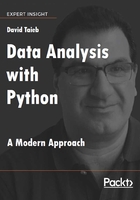
Is data science here to stay?
Let's get straight to the point from the start: I strongly think that the answer is yes.
However, that was not always the case. A few years back, when I first started hearing about data science as a concept, I initially thought that it was yet another marketing buzzword to describe an activity that already existed in the industry: Business Intelligence (BI). As a developer and architect working mostly on solving complex system integration problems, it was easy to convince myself that I didn't need to get directly involved in data science projects, even though it was obvious that their numbers were on the rise, the reason being that developers traditionally deal with data pipelines as black boxes that are accessible with well-defined APIs. However, in the last decade, we've seen exponential growth in data science interest both in academia and in the industry, to the point it became clear that this model would not be sustainable.
As data analytics are playing a bigger and bigger role in a company's operational processes, the developer's role was expanded to get closer to the algorithms and build the infrastructure that would run them in production. Another piece of evidence that data science has become the new gold rush is the extraordinary growth of data scientist jobs, which have been ranked number one for 2 years in a row on Glassdoor (https://www.prnewswire.com/news-releases/glassdoor-reveals-the-50-best-jobs-in-america-for-2017-300395188.html) and are consistently posted the most by employers on Indeed. Headhunters are also on the prowl on LinkedIn and other social media platforms, sending tons of recruiting messages to whoever has a profile showing any data science skills.
One of the main reasons behind all the investment being made into these new technologies is the hope that it will yield major improvements and greater efficiencies in the business. However, even though it is a growing field, data science in the enterprise today is still confined to experimentation instead of being a core activity as one would expect given all the hype. This has lead a lot of people to wonder if data science is a passing fad that will eventually subside and yet another technology bubble that will eventually pop, leaving a lot of people behind.
These are all good points, but I quickly realized that it was more than just a passing fad; more and more of the projects I was leading included the integration of data analytics into the core product features. Finally, it is when the IBM Watson Question Answering system won at a game of Jeopardy! against two experienced champions, that I became convinced that data science, along with the cloud, big data, and Artificial Intelligence (AI), was here to stay and would eventually change the way we think about computer science.